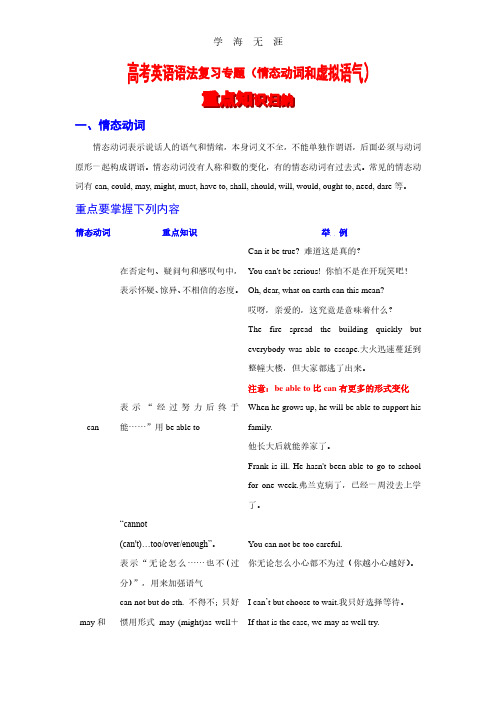2014高考英语语法专题复习 课件35《将来时态》.pdf
2014高考英语语法复习专题精讲精练 情态动词和虚拟语气.pdf

学海无涯
我读完了,你就可以拿走这本书。(允诺)
He shall be punished.他一定会遭到惩罚。(威
胁)
Why/How +should 结构表示说 话人对某事不能理解、感到意 外、惊异等意思,意为“竟会”
Why should you be so late? 你今天来得怎么这 么晚? How should I know? 我怎会知道!(意为:我 不知道。)
could +have done 表示“本可以做而实际上 未能做”。
You could have done better, but you didn’t try your best. 你本来能做得更好的,但你没有尽力。
cannot+ have done 表示“对现在或过去发生 He cannot have been to that small town.
If I had been free, I would have visited you. 如果我有空的话,我就拜访你了。
与将来 事实相反
should/would/ could/might+ 动词原形
过去式 /should+ 动 词 原形/were +to do
If it should rain tomorrow, we would not go camping.如果明天下雨的话,我们就不去野营。
need 还可以用作行为动词,其
变化和一般的动词相同。若主语 We need to have a rest.我们需要休息一下。
为动作承受者时用动词主动形 The house needs repairing.=The house needs to
式表示被动意义或用不定式的 be repaired.这栋房子需要修理。
一般将来时态ppt课件

you
are
(b精e选)ppnt课o件t2b02e1 tter in the evening. 8
• 3.其他一般将来时态结构
• 1.现在进行时表将来(be + doing) • 表示某个按最近的计划或安排即将要进行的动作,an arrangement
for the near • future或即将开始或结束的动作。
• 常用动词位置移动词:go, leave, come, arrive, land, meet, move, return, start, stay, stop, do, dine, give, have, pay, join, publish, spend, sleep, take, change, fly, work, wear, see, play etc.
shall适用于第一人称I,We;而will适用于所有人称。
通常可以用will来代替shall。
will,shall均可缩写为:'ll,如:
I will= I'll;
she will = she’ll;will not 和shall not分别可以
缩写为 won't 和精s选happnt课't件。2021
不能在条件状语从句中表示将来
能在条件状语从句中表示将来
在含有条件状语从句或时间状语从句的复合句中,从句
用一般现在时,主句用一般将来时,且用will而不用be If you are going to attend the meeting,
going to.
you'd better leave now.
2. be going to + 动词原形。 表示(1)打算或准备要做的事情 (2)在客观情况下(非主观打算)要发生的事情。
英语语法一般将来时解析PPT课件

感谢您的观看!
第22页/共22页
他马上要去北京。 区别:be about to do 不能与 tomorrow, next week 等表示明确将来时的时
间状语连用。
第9页/共22页
Practice
第10页/共22页
试翻译以下句子:
1、明天他将教我英语。
H2e、’他们l下l 个te星a期c带h我们m去他e的E花n园。glish tomorrow. T3h、e将y来w,我i要ll成t为a一k个e司u机。s to his garden next week. I will be a driver in the future.
this afternoon等等.
第20页/共22页
• When I was just a little girl ,I asked my mother what will I be? • Will I be pretty, will I be rich? Here's what she said to me. • Que sera, sera. • Whatever will be, will be. The future's not ours to see • Que sera, sera • What will be, will be • When I grew up and fell in love, I asked my sweetheart what lies ahead. • Will we have rainbows day after day? Here's what my sweetheart said • Que sera, sera • Whatever will be, will be. The future's not ours to see • Que sera, sera • What will be, will be? ……
高中英语一般将来时 PPT课件 图文

• ③ be + 动词不定式 • 这一结构中的be,只有现在式 (am, is, are) 和
过去式 (was, were) 两种形式。
• a. 表示按计划或安排将要发生的动作
• The highway is to be open to traffic in May. • 这条公路将在五月份通车。
• ①用于“பைடு நூலகம் expect, I‘m sure, I think, I wonder + 宾语从 句”中
• Don't worry about the exam. I'm sure you'll pass. • 不要担心这次考试,我确信你会通过的。 • I wonder what will happen. • 我不知道将会发生什么事。 • I don't think the test will be very difficult. • 我想这次测验不会太难。
• Flowers will die without water. • 没有水花会枯死的。 • Water will change into ice at 0℃. • 水在零摄氏度就会结冰。 • This will be your sister, I guess. • 我猜想这是你姐姐。
(三)一般将来时的常用结构
• She will get better.
• 她的病会好的。(认为最终会恢复健康的)
• 2)will表示将来,通常是指事先无计划的意图,是临时决定的;
be going to则表示事先有计划的意图,是经过考虑的。 • — George phoned while you were out. • 你外出的时候乔治打电话来的。 • — Ok. I'll phone him back. • 好的,我给他回电话。(临时决定) • — Matthew phoned while you were out. • 你外出的时候马修打电话来了。 • — Yes, I know. I'm going to phone him back. • 是的,我知道了。我准备给他回电话。(早有安排) • 但在正式文体中,要用will来表示事先安排的动作。 • The meeting will begin at 10:00 a.m.. • 会议将在10点开始。 • Coffee will be served from 9:30 from today onwards. • 从今天起9:30开始供应咖啡。
高考英语时态专题复习(共58张PPT)

注意:
(等1)时一刻般表现中在安时排表好示的将。来,es tomorrow.(尽管有tomorrow, 但没有 will ,be going to )
1 一般现在时的用法
2) 客观真理,客观存在,科学事实或表示格言或警句。 ①Knowledge begins with practice. ② She said that the sea water is salty. ③In some parts of the world, such as in England ,
时态和语态的主要考点
1、考查在语境中判断动词时态的运用能力。常考 的时态为:一般现在、一般过去、一般将来、现在 进 行、过去进行、现在完成、过去完成、现在完成 进行、过去将来等。
2、时间、条件、让步等状语从句中动词的时态; 主从句时态呼应问题。
3、几种时态的替代问题.
最常用的几种时态与时间状语的搭配
① be going to 有很强的计划性,打算干什么,而will 表示谈话时临时决定的意图,具有临时性和偶然 性。 ----The telephone is ringing. ----I _____ answer it.
A. will B. am going to C. am to D. am about to ---Alice, why didn’t you come yesterday? ---I _____, but I had an unexpected visitor. A. had B. would C. was going to D. did
英语语法一般将来时 课件 (共35张PPT)

选择:要动动脑啦
1. My younger brother ____be 15 years old next year.
A. will B. is going C. should
2. — Sorry, I forgot to post the letter for you.
— Never mind, _____ post it myself tonight.
Vicky w__ill__be_ 15 years old next year.(be) Vicky 明年15岁了
Will 表示单纯“将要,将来会”无计划性,陈 述事实
三、句型变化 1. 肯定句: 主语+ will +V原型
I will be a teacher in the future. 2.否定句:主语 + will not(won’t)+V原型
be 随主语有am is are 变化
1. 肯定句: 主语 + be going to + V原型
I am going to fly kites the day after tomorrow.
2. 否定句:主语 + be not going to + V原型
She is not going to be a doctor when she grows up.
B: He will go to Australia. A:What will he do?
B: He will see kangaroos
2.be going to+动词原形
be going to ①表示计划,安排要做的事 ②表示现在的迹象推断未来可能
高中英语语法之一般将来时 PPT课件 图文

√B. will D. should
•表示不以人的意志为转移的自然发展的事用 will
4. — Sorry, I forgot to post the letter for you.
— Never mind, _____ post it myself tonight.
A. I’m going to
• 3. will+v.有时表示说话时的临时决定或打算。 --- My car won’t start. --- Don’t worry, I will come and give it a push.
will 和 shall 的缩写形式都是’ll
注意:shall与will的区别:
shall
shall常用于第一人称. 否定式:shall not = shan’t
The evening class begins at 19:00. 晚课7点开始。 The train starts at two. 火车两点出发.
主将从现
• 在时间或条件状语从句中,主句用将来时,从句用 一般现在时表示将来时,标志:when, as soon as, before, once, if , unless, even if, in case等
√C. goes; will learn D. goes; is going to learn
谢谢! 学妹给我打电话,说她又换工作了,这次是销售。电话里,她絮絮叨叨说着一年多来工作上的不如意,她说工作一点都不开心,找不到半点成就感。 末了,她问我:学姐,为什么想 找一份 自己热 爱的工 作这么 难呢? 我问她上一份工作干了多久,她 说不到 三个月 ,做的 还是行 政助理 的工作 ,工作 内容枯 燥乏味 不说, 还特别 容易得 罪人, 实在不 是自己 的理想 型。 我
一般将来时复习课件

如何构成一般将来时?
将来时间状语
例如:tomorrow, next week, in two years。
主语
例如:I, she, they。
动词原形
例如:run, eat, learn。
助动词
例如:will, shall。
一般将来时的使用时机
1
当你在次日安排的日常事件
例如:明天我会学习。
2
当你作出决定或许诺
练习二:改写句子
根据括号内的要求改写下列各句。 1. She will visit Paris. (改为否定句) 2. He will start to learn photography next year. (对划线部分提问) 3. I will finish the work in three hours. (对划线部分提问)
常见的时间状语
明天
Tomorrow
下周
Next week
后天
The day after tomorrow
今年
This year
பைடு நூலகம்
动词的三单形式
在一般将来时中,第三人称单数动词要加 -s 或 -es 后缀。例如:he walks, she eats。 有些动词要变形,例如:go → goes, do → does。
一般现在时与现在进行时的区别
一般现在时用于表述经常性、习惯性的动作,而现在进行时则用于表述当前正在进行的动作。 例如:I always wake up early. / I am washing the dishes now.
完成时态和将来完成时的区别
完成时态用于表达已经完成的动作,而将来完成时则表示将来某个时间点之前完成的动作。 例如:I have finished my homework. / I will have finished my homework before dinner.
高三英语一轮复习将来完成进行时课件

一般
现在
do/does
进行
完成
完成进行
am/is/are doing have/has done have/has been doing
过去
did
was/were doing had done
had been doing
将来
will do
will be doing
will have done will have been doing
将来完成进行时
1.表示某种状况一直持续到说话人所提及的时间。
I shall have been working here in this liquid oxygen industrial zone for twenty years by the end of the year.
到今年年底,我将在这个液氧工业区工作20年。
将来完成进行时(练习)
将来完成进行时
2.表示动作一直延续到将来某一时间。 是否继续下去,要视上下文而定。 这个时态常和表示将来某一时间的状语连用。
By the time the sun rises, I shall have been sleeping for nine hours.
太阳升起来之前,我已经睡了9个小时了。
2. Will he have been climbing mountains for 20 years by the end of this month? No, he won’t.
将来完成进行时 1 定义 2肯定、否定,疑问 3 被动
将来完成进行时(被动)
结构: shall/will + have +been being+ done
高考英语一轮复习语法专题课件35:将来时态(人教版)共29页

11、获得的成功越大,就越令人高兴 。野心 是使人 勤奋的 原因, 节制使 人枯萎 。 12、不问收获,只问耕耘。如同种树 ,先有 根茎, 再有枝 叶,尔 后花实 ,好好 劳动, 不要想 太多, 那样只 会使人 胆孝懒 惰,因 为不实 践,甚 至不接 触社会 ,难道 你是野 人。(名 言网) 13、不怕,不悔(虽然只有四个字,但 常看常 新。 14、我在心里默默地为每一个人祝福 。我爱 自己, 我用清 洁与节 制来珍 惜我的 身体, 我用智 慧和知 识充实 我的头 脑。 15、这世上的一切都借希望而完成。 农夫不 会播下 一粒玉 米,如 果他不 曾希望 它长成 种籽; 单身汉 不会娶 妻,如 果他不 曾希望 有小孩 ;商人 或手艺 人不会 工作, 如果他 不曾希 望因此 而有收 益。-- 马钉路 德。
21、要知道对好事的称颂过于夸大,也会招来人们的反感轻蔑和嫉妒。——培根 22、业精于勤,荒于嬉;行成于思,毁于随。——韩愈
23、一切节省,归根到底都归结为时间的节省。——马克思 24、意志命运往往背道而驰,决心到最后会全部劳动。——乌申斯基
谢谢!
2014高考英语语法专题复习 课件34《一般时态》.pdf

②一般过去时的特殊用法 ? a. 在虚拟语气中表示现在或将来时间的动作或状态? It's time we went.? 是我们该走的时候了。
? I wish I were twenty years younger.? I would(I’d) rather you sent the letter for me. 但愿我年轻20岁。
? I would rather you didn't do anything for the time being.? 我宁愿你暂时先不要采取什么措施。
b. 在口语中,一般过去时往往显示委婉客气。
? I wondered if you could give me a hand.? 我想请你帮个忙。
? Might I come and see you tonight 我想今晚来看你,好吗 3.一般现在时和一般过去时的比较 一般现在时要和现在时间相联系,而一般过去时和说话的“现在”不相联系。
His father is a film director.? 他父亲是电影导演。
(他现在还是) His father was a film director.? 他父亲曾是电影导演。
(他现在不是) How do you like the novel 你觉得这部小说怎么样?(还在看小说) How did you like the novel 你觉得这部小说怎么样?(已看完小说) 3)一般过去时常与下列时间状语连用: yesterday, before liberation, in 1960, two years ago, last month, in the past, the other day,etc. eg.I happened to meet him in the street the other day.1.She set out soon after dark ______ home an hour later. A.arriving B.to arrive C.having arrived D.and arrived2.─Your phone number again?I______quite catch it. ─It's 9568442. A.didn't B.couldn't C.don't D.can't ? A.promises B.promised C.will promise D.had promised3.--Nancy is not coming tonight. --But she_____!4.—You haven't said a word about my new coat, Brenda. Do you like it? — I'm sorry I________anything about it sooner. I certainly think it's pretty on you. A.wasn’t saying B.don’t say C.won’t say D.didn’t say 6. —Jack bought a new mobile phone the other day.[2007 浙江卷] —________? That’s his third one in just one month. A. Had he B. Did he C. Does he D. Has he 7. The play had already been on for quite some time when we ____ at the New Theatre. [2007 浙江卷] A. have arrivedB. arrivedC. had arrivedD. arrive 1、(08浙江卷’05) I don’t believe you’ve already finished reading the book — I ______it to you this morning! A. would lendB. was lendingC. had lentD. lent 1.The tiger in the zoo frightened the little girl. 2.They gave him a medal for his wonderful work. The little girl was frightened by the tighter in the zoo. He was given a medal for his wonderful work. 3.The Simple Future Tense 1)结构(Active) will do (Passive) will be done 2)主要用法: ①表示将来的动作和状态。
高中英语课件-一般将来时

What time does the train leave?
Summary
一般现在时e is leaving for London tomorrow. 现在进行时表示将来的结构:be +动词ing 形式
能用进行时表将来的动词(并非所有动词)
1. A: When are you leaving for Shanghai? B: Next Sunday. present continuous tense
I shall be seventeen years old next month. 2.will表示临时的意愿。(愿意去做某 事) If you will go, I will go with you.(如果 你愿意去,我也愿意和你去)
3. will 表示必然趋势 Fish will die without water.
2) 表示交通方式、行程安排的动词, 例如 fly, walk, ride, drive, take (a bus, a taxi)等的现在进行时也经常 用于表示将来。
1.We wareree meeting them outside the theatre
at 7 so I have to leave now. F
We are to have an exam next week. He is to be a dancer.
四. be about to do 意为“刚要,正要”, 表示非常近的将来。不与表示将来的时 间状语连用。(但常与when连用) ➢ be about to do…when… 正要做….., 这时……
二: be going to do:表示按计划安排的事情 (可能发生也可能不会发生)。
- 1、下载文档前请自行甄别文档内容的完整性,平台不提供额外的编辑、内容补充、找答案等附加服务。
- 2、"仅部分预览"的文档,不可在线预览部分如存在完整性等问题,可反馈申请退款(可完整预览的文档不适用该条件!)。
- 3、如文档侵犯您的权益,请联系客服反馈,我们会尽快为您处理(人工客服工作时间:9:00-18:30)。
“be going to + 动词原形”与“will / shall + 动词原形”的区别 ? 1.be going to通常表示很快就要发生的事,而will/shall既可表示不久的将来,也可表示长远的将来或不确定的将来 She is going to get better.? 她的病要好了。
(有恢复健康的迹象) She will get better.? 她的病会好的。
(认为最终会恢复健康的) 2.will表示将来,通常是指事先无计划的意图,是临时决定的; be going to则表示事先有计划的意图,是经过考虑的。
?1 —? George phoned while you were out.? 你外出的时候乔治打电话来的。
? —? Ok. I'll phone him back.? 好的,我给他回电话。
(临时决定)2 ? —? Matthew phoned while you were out.? 你外出的时候马修打电话来了。
? —? Yes, I know. I'm going to phone him back.? 是的,我知道了。
我准备给他回电话。
(早有安排) 3.表示有迹象显示将要发生某一动作时,要用be going to,不用will或shall。
I feel terrible. I think I‘m going to be sick.? 我觉得不舒服,我想我要生病了。
4.be going to 可用于条件句,表示将来时间,will则不能。
If you are going to attend the meeting, you'd better leave now. 如果你要出席会议,你最好现在就动身。
②be + 动词的-ing形式 ? “be + 动词的-ing形式”表示根据现在的计划或安排,预期将会发生某事,这种安排不容随意改变。
如 arrive, come, go, leave, move, start, stay, get 以及eat, meet, see off, die等,并与表示将来的时间状语连用。
如果没有时间状语,则所表示的动作有即将发生之意。
He is leaving for Xinjiang in a few days.? 他几天后要动身去新疆 I am dining out tonight.? 今晚我将出去吃饭 The plane is taking off soon. ? 飞机马上就要起飞了 ? The old man is dying.? 那位老人快要死了。
③ be + 动词不定式? 这一结构中的be,只有现在式 (am, is, are) 和过去式 (was, were) 两种形式。
a. 表示按计划或安排将要发生的动 The highway is to be open to traffic in May.? 这条公路将在五月份通车。
? Am I to take over his work 我是不是要接管他的工作? b. 用于条件句中强调按计划或安排将要发生的动作 ? If we are to take the 5:00 train, we must leave now. 如果我们乘坐5点的火车的话,那我们现在就得出发。
? c. 表示命令或吩咐等。
否定形式常表示“禁止”或“不许”。
You are to be back before 10 p.m. 你必须在10点前回来。
You are not to go out alone at night.? 晚上你不能单独出去。
1 —How can I apply for an online course? —Just fill out this form and we _____ what we can do four you. [2007 北京卷] A. see B. are seeing C. have seenD. will see 1 If their marketing plans succeed, they ____ their sales by 20 percent. (08全国卷II’14) A. will increase B. have been increasing C. have increased D. would be increasing 1. I along the street looking for a place to park when the accident .(2006安徽 A.went; was occurring B.went; occurred C.was going; occurred D.was going; had occurred 2 —Tom, you didn’t come to the party last night?—I ____, but I suddenly remembered I had homework to do. [2007 全国卷II]A. had to B. didn’t C. was going toD. wouldn’t 3 John promised his doctor he _____ not smoke, and he has smoked ever since. (08北京卷’ 21) A. might B. should C. could D. would. * * 2014高考英语《语法》专题复习系列课件 35《将来时态》 5 —I saw Jane and her boyfriend in the park at eight yesterday evening.[2007 福建卷] —Impossible. She TV with me in my home then. A. watched B. had watche C. would watch D. was watching 619. —Ouch! You hurt me! —I am sorry. But I any harm. I to drive a rat out. [2007 江西卷] A. didn’t mean; tried B.don’t mean; am trying C. haven’t meant; tried D. didn’t mean; was trying 将来进行时 1.将来进行时的构成 ? 将来进行时是由“shall/will + be +现在分词”构成的。
? Don't phone me between 8:00 and 10:00. We'll be having classes then.? 8点到10点之间不要给我打电话,我们那时正在上课。
? Will you be using your bicycle this evening 今晚你用自行车吗?? She won't be having a meeting in her office at 8:00 tomorrow.?明天8点她不在开会。
2.将来进行时的用法 ? ①将来进行时的基本用法? a. 表示在将来某一时间正在进行的动作? I'll be taking my holiday soon.? 我不久就去度假了。
? They will be meeting us at the station.? 他们会在车站接我们的 b. 在口语中代替will/shall do? I hope you will be coming on time.? 我希望你按时来。
? I'll be seeing Mr. Smith tomorrow. 我明天将见到史密斯先生。
? The minister will be giving a speech on international affairs.? 部长将就国际事务发表演讲。
? ②将来进行时的特殊用法 ? a. 表示原因、结果或猜测? Please come tomorrow afternoon. Tomorrow morning I'll be having a meeting.? 请你明天下午来吧。
我明天上午有个会。
(表原因)? Stop the child or he will be falling over.? 抓住那个孩子,要不他会掉下去的。
(表结果)? You will be making a mistake.? 你会出错的。
(表推测) b. 用在问句中,表示委婉礼貌? Will you be reading anything else 你还要看点儿什么吗?? When shall we be meeting again 我们什么时候再见面?? c. 表示稍后一点儿的安排? The students aer studying Unit 3 this week, and next week we'll be studying Unit 4.这星期我们学第三单元,下周我们将学第四单元。
My duties will end in July and I will be returning to Shanghai.? 我的任务在7月结束,之后我会回上海。
一般将来时 1. 一般将来时的构成 一般将来时是由“will / shall + 动词原形”构成的。
shall只限于第一人称,主要见于英国英语,现在的趋势是第一、二、三人称的单复数形式均用will表示。
在口语中,shall和 will常缩写成“'ll”,紧接在主语之后。
其否定式shall not 和will not 常简略为shan't 和won't。
? I'll go and shut the door.? 我去关门。
? When will you know your exam results 你什么时候能知道考试结果? I can see you're busy, so I won't stay long.? 我看得出你很忙,所以我不会呆太久的。
2.一般将来时的用法 ①表示将要发生的动作或存在的状态 ? I shall be free this afternoon.? ?There'll be no chemistry classes tomorrow.? They will probably go to Shanghai for their holiday.? ? 注意:在口语中,常用will / shall + be doing结构来代替will / shall + 动词原形,以表示生动。
